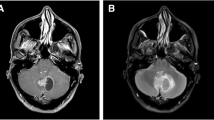Abstract
Histiocytic sarcoma (HS) is a rare but aggressive malignant neoplasm of histiocytic lineage with a poor prognosis. Immunohistochemically, the neoplastic cells are positive for CD163, CD68, and lysozyme, and negative for B and T cell markers. However, molecular studies on the origin of the neoplastic cells remain inconclusive. A 54-year-old woman was admitted to our hospital because of painful swelling of the left knee. Examination revealed generalized lymphadenopathy and splenomegaly. HS was diagnosed according to morphologic and immunohistochemical features observed on biopsy of the left inguinal lymph node. The tumor demonstrated a clonal immunoglobulin heavy chain gene rearrangement and a clonal cytogenetic abnormality including t(14;18) which was confirmed by fluorescence in situ hybridization analysis showing the IgH/BCL2 fusion gene. The neoplastic cells were negative for PAX5, a B cell associated transcription factor, and positive for CEBPβ, a transcription factor mediating macrophage and myeloid differentiation. Positron emission tomography showed disseminated areas of increased 18F-fluorodeoxyglucose uptake in multiple lymph nodes, the liver, spleen, both lungs, both kidneys, and many bony sites. The patient received localized irradiation therapy followed by chemotherapy, she failed to respond and died of the disease progression. The case findings suggest lineage promiscuity or plasticity related to the pathogenesis of HS.





Similar content being viewed by others
References
Swerdlow SH, Campo E, Harris NL, Jaffe ES, Pileri SA, Stein H, Thile J eds. World Health Organization classification of tumours of haematopoietic and lymphoid tissues. 4th ed. Lyon: International Agency for Research on Cancer (IARC); 2008.
Hornick JL, Jaffe ES, Fletcher CDM. Extranodal histiocytic sarcoma: clinicopathologic analysis of 14 cases of a rare epithelioid malignancy. Am J Surg Pathol. 2004;28:1133–44.
Feldman AL, Arber DA, Pittaluga S, Martines A, Burke JS, Raffeld Camos M, Warnke R, Jaffe ES. Clonally related follicular lymphomas and histiocytic/dendritic cell sarcomas: evidence for transdifferentiation of the follicular lymphoma clone. Blood. 2008;111:5433–9.
Chen W, Lau SK, Fong D, Wang J, Wang E, Arber DA, Weiss LM, Huang Q. High frequency of clonal immunoglobulin receptor gene rearrangements in sporadic histiocytic/dendritic cell sarcomas. Am J Surg Pathol. 2009;33:863–73.
Vos JA, Abbondanzo SL, Barekman CL, Andriko JW, Miettinen M, Aguilera NS. Histiocytic sarcoma: a study of five cases including the histiocyte marker CD163. Mod Pathol. 2005;18:693–704.
Nguyen TT, Schwartz EJ, West RB, Warnke RA, Arber DA, Natkunam Y. Expression of CD163 (hemoglobin scavenger receptor) in normal tissues, lymphomas, carcinomas, and sarcomas is largely restricted to the monocyte/macrophage lineage. Am J Surg Pathol. 2005;29:617–24.
Mikami M, Sadahira Y, Suetsugu Y, Wada H, Sugihara T. Monocyte/macrophage-specific marker CD163+ histiocytic sarcoma: case report with clinical, morphologic, immunohistochemical, and molecular genetic studies. Int J Hematol. 2004;80:365–9.
Wetzler M, Kurzrock R, Goodacre AM, McLaughlin P, Ku S, Talpatz M. Transformation of chronic lymphocytic leukemia to lymphoma of true histiocytic type. Cancer. 1995;76:609–17.
Alvaro T, Bosch R, Salvado MT, Piris MA. True histiocytic lymphoma of the stomach associated with low-grade B-cell mucosa-associated lymphoid tissue (MALT)-type lymphoma. Am J Surg Pathol. 1996;20:1406–11.
Feldman AL, Minniti C, Santi M, Downing JR, Raffeld M, Jaffe ES. Histiocytic sarcoma after acute lymphoblastic leukaemia: a common clonal origin. Lancet Oncol. 2004;5:248–50.
Bassarova A, Trøen G, Fosså A, Ikonomou IM, Beiske K, Nesland JM, Delabie J. Transformation of B cell lymphoma to histiocytic sarcoma: somatic mutations of PAX-5 gene with loss of expression cannot explain transdifferentiation. J Hematop. 2009;2:135–41.
Zhang D, McGuirk J, Ganguly S, Persons DL. Histiocytic/dendritic cell sarcoma arising from follicular lymphoma involving the bone: a case report and review of literature. Int J Hematol. 2009;89:529–32.
Wang E, Hutchinson CB, Huang Q, Sebastian S, Rehder C, Kanaly A, Moore J, Dato M. Histiocytic sarcoma arising in indolent small B-cell lymphoma: report of two cases with molecular/genetic evidence suggestive of a ‘transdifferentiation’ during the clonal evolution. Leuk Lymphoma. 2010;51:802–12.
Xie H, Ye M, Feng R, Graf T. Stepwise reprogramming of B cells into macrophages. Cell. 2004;117:663–76.
Cobaleda C, Schebesta A, Delogu A, Busslinger M. Pax5: the guardian of B cell identity and function. Nat Immunol. 2007;8:463–70.
Yu D, Allman D, Goldschmidt MH, Atchison ML, Monroe JG, Thomas-Tikhonenko A. Oscillation between B-lymphoid and myeloid lineages in Myc-induced hematopoietic tumors following spontaneous silencing/reactivation of the EBF/Pax5 pathway. Blood. 2003;101:1950–5.
Cobaleda C, Jochum W, Busslinger M. Conversion of mature B cells into T cells by dedifferentiation to uncommitted progenitors. Nature. 2007;449:473–7.
Yaman E, Ozturk B, Erdem O, Gokcora N, Coskun U, Uluoglu O, Benekli M. Histiocytic sarcoma: PET-CT evaluation of a rare entity. Ann Nucl Med. 2008;22:715–7.
Buonocore S, Valente AL, Nightingale D, Bogart J, Souid AK. Histiocytic sarcoma in a 3-year-old male: a case report. Pediatrics. 2005;116:e322–5.
Alexiev BA, Sailey CJ, McClure SA, Ord RA, Zhao XF, Papadimitriou JC. Primary histiocytic sarcoma arising in the head and neck with predominant spindle cell component. Diagn Pathol. 2007;2:1–7.
Pileri SA, Grogan TM, Harris NL, Banks P, Campo E, Chan JK, Favera RD, Delsol G, De Wolf-Peeters C, Falini B, Gascoyne RD, Gaulard P, Gatter KC, Isaacson PG, Jaffe ES, Kluin P, Knowles DM, Mason DY, Mori S, Müller-Hermelink HK, Piris MA, Ralfkiaer E, Stein H, Su IJ, Warnke RA, Weiss LM. Tumours of histiocytes and accessory dendritic cells: an immunohistochemical approach to classification from the International Lymphoma Study Group based on 61 cases. Histopathology. 2002;41:1–29.
Yoshida C, Takeuchi M. Histiocytic sarcoma: identification of its histiocytic origin using immunohistochemistry. Intern Med. 2008;47:165–9.
Abidi MH, Tove I, Ibrahim RB, Maria D, Peres E. Thalidomide for the treatment of histiocytic sarcoma after hematopoietic stem cell transplant. Am J Hematol. 2007;82:932–3.
Acknowledgments
We would like to thank Dr. Shigeo Nakamura, Professor of Department of Pathology and Clinical Laboratories, Nagoya University School of Medicine, for the pathological diagnosis.
Author information
Authors and Affiliations
Corresponding author
About this article
Cite this article
Hayase, E., Kurosawa, M., Yonezumi, M. et al. Aggressive sporadic histiocytic sarcoma with immunoglobulin heavy chain gene rearrangement and t(14;18). Int J Hematol 92, 659–663 (2010). https://doi.org/10.1007/s12185-010-0704-8
Received:
Revised:
Accepted:
Published:
Issue Date:
DOI: https://doi.org/10.1007/s12185-010-0704-8




